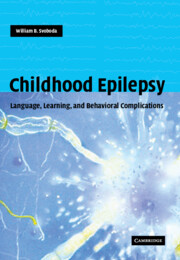Book contents
- Frontmatter
- Contents
- Preface
- Glossary
- 1 Looking ahead
- Part I Speech and language problems
- 2 Language: the challenge
- 3 Speech, language, and communication
- 4 Speech and language problems in epilepsy
- 5 Seizure types and speech and language risks
- 6 Language regression with epilepsy syndromes
- 7 Other epilepsy language syndromes
- 8 Seizure-management effects
- 9 Evaluation of speech and language problems
- 10 Management of speech and language problems in epilepsy
- 11 Behavior consequences
- Part II Learning problems
- Part III Behavior problems
- Index
- References
9 - Evaluation of speech and language problems
from Part I - Speech and language problems
Published online by Cambridge University Press: 26 October 2009
- Frontmatter
- Contents
- Preface
- Glossary
- 1 Looking ahead
- Part I Speech and language problems
- 2 Language: the challenge
- 3 Speech, language, and communication
- 4 Speech and language problems in epilepsy
- 5 Seizure types and speech and language risks
- 6 Language regression with epilepsy syndromes
- 7 Other epilepsy language syndromes
- 8 Seizure-management effects
- 9 Evaluation of speech and language problems
- 10 Management of speech and language problems in epilepsy
- 11 Behavior consequences
- Part II Learning problems
- Part III Behavior problems
- Index
- References
Summary
Much of learning and the day-to-day social interactions of life depend on communication. Subtle speech and language problems impair learning and inhibit social development. Discipline, explanations, and instructions are based largely on the spoken word.
Subtle seizure short-circuits may impair the epileptic child's functioning in many ways. Proper help depends on early recognition and confirmation of the problem, followed by appropriate, practical, remediative help. Children who have epilepsy are at risk of developing speech and language problems and should be evaluated at four levels, depending on their needs: (1) awareness and subsequent screening, (2) formal basic hearing and speech testing, (3) in-depth language-processing studies, as indicated, and (4) applied language arts, especially in practical situations, by both the therapist and others (parents, teachers, etc.). The main challenge is suspecting the problem and confirming that it exists (Bradford, 1980).
Too often, a physician tells the parents that a young child will probably grow out of the problem. This is not true. A child who has delayed speech or a deviation from normal that is significant enough to disturb the parents, frustrate the child, or be apparent to the teacher or physician should be referred for speech and language evaluation. Both relaxed testing and testing under stress is helpful, as stress can bring out deficits that may be overlooked in the usual, relaxed speech-testing situation.
Awareness and screening
Language problems in children with epilepsy occur frequently enough such that all children with epilepsy should be screened for possible speech and language problems.
Information
- Type
- Chapter
- Information
- Childhood EpilepsyLanguage, Learning and Behavioural Complications, pp. 133 - 140Publisher: Cambridge University PressPrint publication year: 2004
